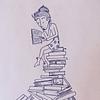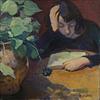Take a photo of a barcode or cover
adventurous
funny
informative
lighthearted
mysterious
medium-paced
Plot or Character Driven:
A mix
informative
mysterious
medium-paced
Plot or Character Driven:
Plot
Strong character development:
No
Loveable characters:
Yes
Diverse cast of characters:
No
Flaws of characters a main focus:
No
This is a historical mystery more than a crime story. Tey sets herself the task, Oulipo-style, of the narrator never leaving his hospital bed. The fable of the supposed wickedness of Richard III makes some questionable points about facial determinism but is very enjoyable nevertheless and applies the crime solving deduction glasses to one of English history's most compelling tales.
random pick on my part off my mom's bookshelf and although I never read mysteries I was disappointed that this wasn't a traditional mystery but rather a bed-ridden detective unravels a historical mystery about Richard III.
"Daughter of Time", alluding to proverbial Truth, is an investigation into the murder of the Princes in the Tower. Did Richard III do it, as the general public, influenced by Shakespeare, believe? Or was it someone else with even more to gain?
Our sleuth here is Scotland Yard detective Alan Grant, assisted by a young American doing research at the British Museum. Unusually for a detective mystery, Grant is confined to bed, having broken his leg while chasing his suspect. He makes up for his lack of physical agency by relentlessly pursuing the truth behind the historical mystery his actress friend Marta Hallard plops in his lap as a cure for his utter boredom: why does Richard III, remembered by history as an evil hunchback, look so much like a sober judge? Grant turns his policeman's eye on the case, judging the tone of the chroniclers as he would assess a witness.
I have to admit that I was a bit put off by the sheer number of names and events recited in the beginning of the book. But as the investigation developed I became enthralled. The idea of writing up an argument for the solution of a historical mystery as a novel is really fascinating, and there are the twists and turns of a traditional mystery as more evidence is discovered in old papers and historical books. The book is also an indictment of how history is written, without reference to the psychology of the individual. (Grant's own penchant for physiognomy makes the pendulum swing a little too much the other way though.)
Was Josephine Tey right, and was Richard III really innocent? According to Wikipedia and other reviews I've read, there are a few pieces of evidence that she didn't include that might swing the argument back towards Richard III being the murderer of his nephews. But, much like the recent Serial podcast, what this book does is introduce reasonable doubt into what has traditionally been the accepted explanation. It's too bad it's not more widely read. I do recommend it wholeheartedly.
Our sleuth here is Scotland Yard detective Alan Grant, assisted by a young American doing research at the British Museum. Unusually for a detective mystery, Grant is confined to bed, having broken his leg while chasing his suspect. He makes up for his lack of physical agency by relentlessly pursuing the truth behind the historical mystery his actress friend Marta Hallard plops in his lap as a cure for his utter boredom: why does Richard III, remembered by history as an evil hunchback, look so much like a sober judge? Grant turns his policeman's eye on the case, judging the tone of the chroniclers as he would assess a witness.
I have to admit that I was a bit put off by the sheer number of names and events recited in the beginning of the book. But as the investigation developed I became enthralled. The idea of writing up an argument for the solution of a historical mystery as a novel is really fascinating, and there are the twists and turns of a traditional mystery as more evidence is discovered in old papers and historical books. The book is also an indictment of how history is written, without reference to the psychology of the individual. (Grant's own penchant for physiognomy makes the pendulum swing a little too much the other way though.)
Was Josephine Tey right, and was Richard III really innocent? According to Wikipedia and other reviews I've read, there are a few pieces of evidence that she didn't include that might swing the argument back towards Richard III being the murderer of his nephews. But, much like the recent Serial podcast, what this book does is introduce reasonable doubt into what has traditionally been the accepted explanation. It's too bad it's not more widely read. I do recommend it wholeheartedly.
A reread - I so very love this book, even if the history is dubious it’s very convincing.
mysterious
relaxing
medium-paced
Plot or Character Driven:
Plot
I’d give it 10 stars! One of the best books I‘ve read in the past years
adventurous
challenging
funny
informative
inspiring
mysterious
reflective
medium-paced
Plot or Character Driven:
Character
Strong character development:
Yes
Loveable characters:
Yes
Diverse cast of characters:
No
Flaws of characters a main focus:
Complicated




